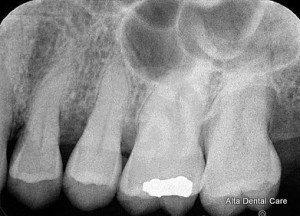Your gums are group of soft tissues that surround your teeth and protect your jaw bones. Healthy gums are pink in color, firm in texture, have smooth scalloped appearance surrounding the tooth and do not bleed during and after tooth brushing. Deviations from these norms may signify an existing gum disease.
Gum disease, otherwise known as periodontal disease, is a chronic inflammatory condition where the soft tissues that surround and support the teeth are damaged. The cause of this disease is often attributed to poor oral hygiene. Infrequent brushing and flossing can result to plaque build-up and accumulation that will not only harm the teeth but also the gums surrounding them. The plaque build-up may irritate the gum tissues and these tissues will start to separate from the tooth, forming periodontal pockets. These pockets will serve as a containing area for more bacterial build-up thus encouraging infection. If left untreated, the infection will proceed to the tooth’s connective tissue and jaw bones and cause harm, which may eventually lead to tooth loss.
Symptoms of gum disease include:
- red, swollen and tender gums
- presence of blood during and after tooth brushing
- chronic bad breath and/or bad taste in the mouth
- receding gums
- loose tooth
- formation of deep dental pocket when probed during oral examination
It is important for your dentist to identify the type and stage in treating gum diseases. Gum disease in its early stage is called gingivitis and is characterized by red, swollen, tender and bleeding gums. It is easier to treat because the condition is reversible. Gingivitis is treated with non-surgical procedure called scaling and root planing. It is a deep-cleaning procedure where the plaque and tartar found above and below the gum line are scrapped and the rough spots left on the tooth are polished.
Failure to treat gingivitis may lead to periodontitis – a condition where the soft tissues in your mouth are destroyed and the bones supporting your teeth are damaged. Treatments during this stage include: pocket reduction surgery, soft tissue grafting and bone grafting.Periodontitis may result to tooth loss if left untreated.
As they say prevention is always better than cure. Prevent gum diseases with brushing your teeth at least twice a day, flossing at least once a day and have your teeth professionally cleaned and examined by your dentist twice a year. If you or any of your loved ones experience gum diseases, have your dentist examined them and follow the treatment to manage the disease.
